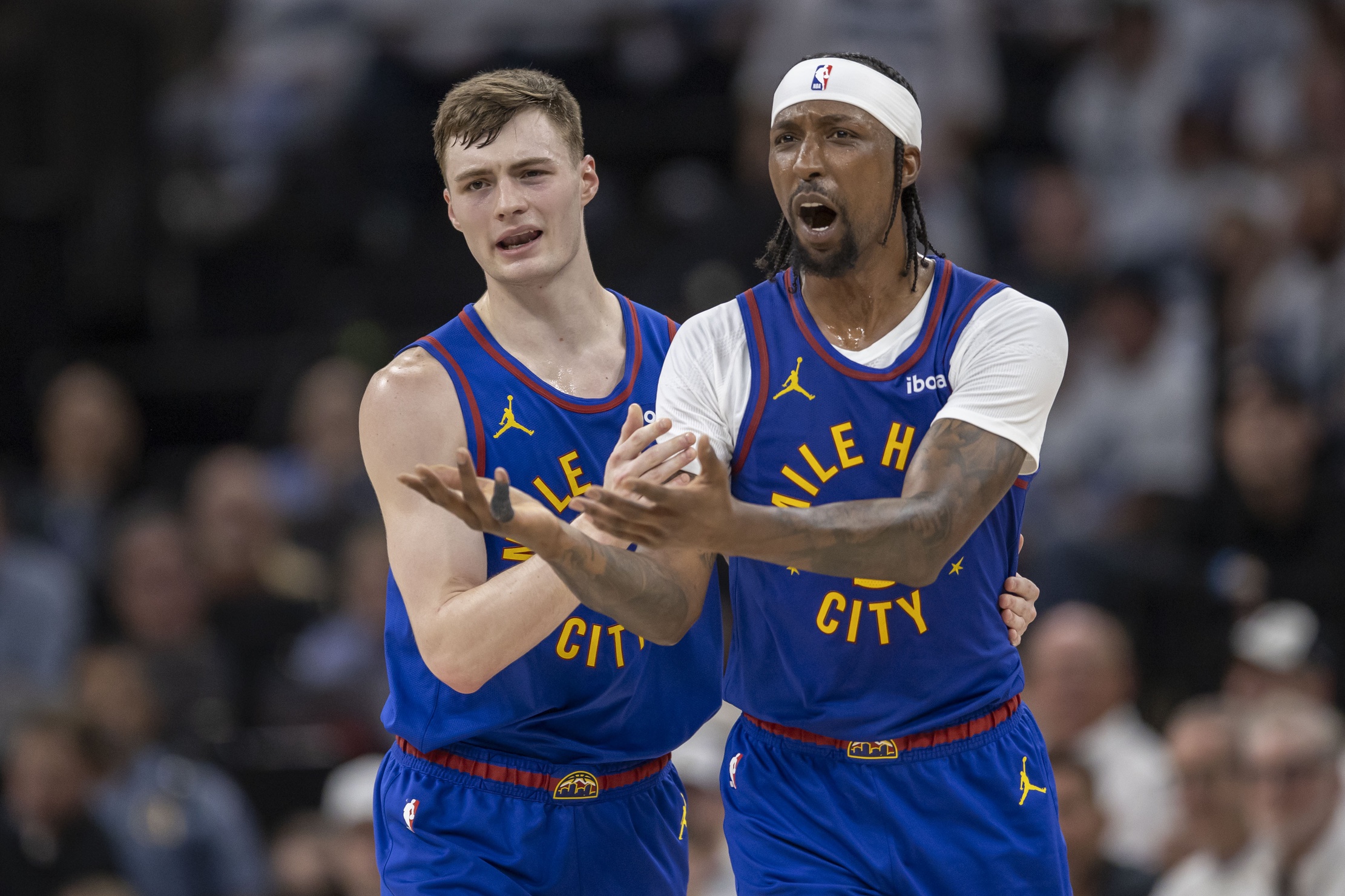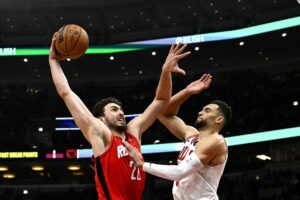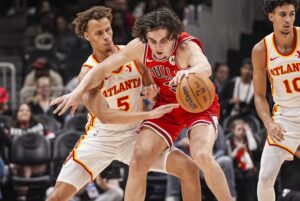The Nuggets are coming off their title defense which ended in the second round of the playoffs. This offseason has presented a series of difficult decisions for the team. The most notable of these decisions was the departure of Kentavious Caldwell-Pope, a key contributor during their title run. Nuggets President Josh Kroenke addressed the Denver Nuggets’ offseason choices and strategy during an interview after the Gardner Heidrick Pro-Am. These comments shed light on why the front office chose not to retain KCP and explain the broader vision for the future of the franchise.
NBA Business: The Denver Nuggets 2024 Offseason Strategy Has Merit
The Loss of KCP: A Calculated Risk
The decision to let Caldwell-Pope walk in free agency has been polarizing. Despite having the opportunity to re-sign him under the NBA’s Bird Rights, the Nuggets declined to match Orlando’s three-year, $66 million offer. Kroenke acknowledged that once KCP opted to test the open market, the writing was on the wall.
“Once we knew that (Caldwell-Pope) was going to opt out and test the open market, we thought it would probably be pretty difficult to retain him,” Kroenke said. “We had some pretty good offers in that we thought made sense for us going forward, but when you hit the open market and there are teams that have space and there are teams that really need a certain skill set, (it’s difficult).”
KCP’s departure has left fans and analysts questioning the decision, but the Nuggets’ front office appears confident in their long-term vision. The team’s decision to not exceed certain financial thresholds, particularly the NBA’s second tax apron, seems to have been a key factor in their strategy. This apron, part of the league’s new Collective Bargaining Agreement (CBA), is designed to penalize teams with exorbitant payrolls, making it harder for them to add depth through free agency or trades.
The Second Tax Apron: An Impending Challenge
One of the most pressing challenges for NBA teams is navigating the financial constraints introduced by the new CBA. For Kroenke and the Nuggets, balancing current competitiveness with future flexibility is critical.
“We’ve been smart about how we’ve planned, and we think we have young players that can fill in to certain roles, and so we also have to think for the future in the new system,” Kroenke explained.
The CBA’s second apron, in particular, has forced teams to become more cautious with long-term contracts and high payrolls. Teams that exceed this second apron face severe restrictions, including limitations on mid-level exception signings and trades, reducing the flexibility to adjust rosters. Kroenke compared this situation to the salary cap structure in the NHL, where careful planning and forward-thinking are essential.
“It’s much more relatable to the NHL style, even though the NBA’s not a pure hard cap,” Kroenke said. “In the NHL, whenever you think about contracts and you start to plan, you have to think a year or two ahead. Because if you give up space, and you have to wind up getting off players to give up something you don’t want to give up, that’s not a good place to be.”
This focus on the long term has led to the Nuggets making the tough decision to part ways with KCP in favor of maintaining flexibility for future roster moves.
Future Spending and Roster Planning
The Nuggets’ decision to sacrifice some depth by not re-signing KCP could also signal a broader strategy of prioritizing versatility and depth over star power. This offseason, Denver added Russell Westbrook and Dario Saric to their roster. While these moves have raised eyebrows, the front office believes that these players will add value, particularly in bolstering their bench, without compromising future cap flexibility.
Kroenke acknowledged that the team has to plan carefully, especially with key players like Aaron Gordon, Christian Braun, and Peyton Watson nearing contract negotiations. Gordon becomes extension-eligible soon, while Braun and Watson are still on rookie deals, giving the team some breathing room for now.
“So we’re pretty excited about the group we’ve got — while also planning and keeping an eye on that future and making sure we have our flexibility to retain the guys we want to keep,” Kroenke emphasized.
In other words, while letting go of Caldwell-Pope may appear to weaken the team in the short term, the Nuggets are betting on their young core and strategic additions like Westbrook and Saric to make up for it, all while ensuring they have the financial flexibility to keep their championship window open for years to come. Players such as Braun, Watson, and Julian Strawther will all be crucial parts of the Nuggets’ success this upcoming season.
The Implications of Financial Constraints
As the Nuggets move forward, the big question for fans is whether the team will be willing to exceed the second tax apron in future seasons if it means retaining key players or pursuing additional talent. Kroenke’s comments suggest that the team will be cautious about surpassing the apron, even if it limits their ability to make blockbuster signings.
A comparison to the NHL model highlights the importance of long-term planning. In the NHL, teams often need to balance the cap for years in advance, avoiding short-term, high-cost contracts that could cripple their flexibility in the future. The Denver Nuggets seem to have built their offseason strategy around this approach. They are favoring long-term flexibility over immediate gratification.
Did the KCP situation set a precedent for how the Nuggets will approach free agency in the future? The answer seems to be yes, at least for now.
The Denver Nuggets 2024 Offseason: A Pragmatic Strategy
The Nuggets are in a unique position after their championship in 2023. With superstars like Nikola Jokic and Jamal Murray leading the charge, the team is poised to remain competitive for years to come. However, the departure of Caldwell-Pope and the team’s calculated approach to spending this offseason highlight the delicate balance they must strike.
Kroenke’s comments suggest that the Nuggets are focused on ensuring their long-term flexibility under the new CBA, even if it means making difficult decisions in the short term. While this approach may frustrate fans who hoped for a more aggressive offseason, it reflects a broader strategy designed to keep the Nuggets competitive on a sustainable budget.
The Nuggets’ championship window may remain open, but only time will tell if their careful financial strategy will continue to yield success. For now, the team is betting that a slightly altered roster and a more flexible cap situation will keep them in contention for future titles. That strategy has merit. It’s not flashy but it is effective.






